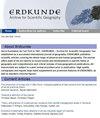通过混合方法分析野火发生:克罗地亚地中海地区的案例研究
IF 1.1
4区 社会学
Q3 GEOGRAPHY
引用次数: 3
摘要
沿海化、社会经济结构调整和农业放弃等进程促进了地中海土地覆盖的变化,从而导致该区域火灾风险的增加。这些过程在一定程度上是由人们的价值观、信仰和传统知识驱动的,因此适合采用定性和定量研究方法。然而,尽管人为因素在野火发生中的重要性和人与环境关系的复杂性,迄今为止这类研究几乎完全是定量的。本研究旨在通过混合方法分析克罗地亚达尔马提亚地中海地区野火发生的驱动因素。克罗地亚在过去30年中经历了迅速的社会和经济变化,影响了生计战略和景观配置。该研究包括对两个火灾季节(2011年和2013年)的一组变量的空间和统计分析,以及对该地区消防员和农民的深入采访。结果表明,草地和灌丛(沼泽)是该地区野火发生的重要驱动因素之一,可以看作是农业撂荒过程的指标。研究表明,农民和消防员对利用农业燃烧来预防野火有不同的看法,但普遍认为野火只对人类生命和物质财产构成风险,而忽视了对生态系统服务的潜在风险。本文章由计算机程序翻译,如有差异,请以英文原文为准。
Analysing wildfire occurrence through a mixed-method approach: a case study from the Croatian Mediterranean
Processes such as littoralization, socio-economic restructuring and agricultural abandonment facilitate land cover changes in the Mediterranean, which then lead to an increased fire risk in the region. These processes are in part driven by people’s values, beliefs and traditional knowledge, lending itself to both qualitative and quantitative research approaches. However, despite the importance of human factors in wildfire occurrence and the complexity of humanenvironmental relations, such studies so far have been almost exclusively quantitative. This research aims at analysing the drivers of wildfire occurrence in the Mediterranean region of Dalmatia, Croatia through mixed-method approach. Croatia has gone through rapid social and economic changes in the past 30 years which have affected livelihood strategies and landscape configuration. The study includes spatial and statistical analysis of a set of variables during two fire seasons (2011 and 2013), but in-depth interviews with fire-fighters and farmers in the region as well. The results show that grassland and shrubland (maquis) are one of the most important drivers of wildfire occurrence in the region, and that they can be seen as indicators of the process of agricultural abandonment. The research demonstrated differing opinions on the use of agricultural burning in preventing wildfires between farmers and fire-fighters, but a common view of wildfires posing a risk only to human life and material property, disregarding potential risk to ecosystem services.
求助全文
通过发布文献求助,成功后即可免费获取论文全文。
去求助
来源期刊

Erdkunde
地学-自然地理
CiteScore
2.00
自引率
7.10%
发文量
17
审稿时长
>12 weeks
期刊介绍:
Since foundation by Carl Troll in 1947, ''ERDKUNDE – Archive for Scientific Geography'' has established as a successful international journal of geography. ERDKUNDE publishes scientific articles covering the whole range of physical and human geography. The journal offers state of the art reports on recent trends and developments in specific fields of geography and comprehensive and critical reviews of new geographical publications. All manuscripts are subject to a peer-review procedure prior to publication. High quality cartography and regular large sized supplements are prominent features of ERDKUNDE, as well as standard coloured figures.
 求助内容:
求助内容: 应助结果提醒方式:
应助结果提醒方式:


